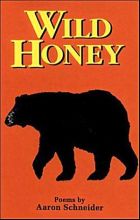 Wild Honey
Wild Honey
Aaron Schneider
Breton Books
In the title piece of Wild Honey, Aaron Schneider’s recent collection of poetry, the narrator describes how he tracks some bees back to their hidden hive in a forest. He marks the spot so that he can return in winter, while the bees hibernate, and steal their labouriously collected honey for himself. The poem ends with a darkly whimsical dream image of the bees, attracted by the stolen honey, swarm the man and “…eat / the honey from my cloyed lips. / my drowsy drunken flesh, tear / the wings from my eyes, fill me / like a hive, with a spring swarm. / with a new queen.” It is a powerful image; funny and nightmarish, pointing out how a man satiates his needs from nature, but the recognition of nature’s power to strike back.
The tension in most of the forty-five poems of this slim volume arises from an individual’s urge to escape from an anti-nature civilization (as in “Morning News”: “From half a mile engines roar / my neighbour is destroying his land / he believes it is his right”) only to find oneself already too far removed from nature to reclaim a place in it. In “Chicken”, this realization becomes comedy: “I am free like the only chicken / outside the pen / circling the mesh / looking for a way to get in.” In “Madman’s Mesa”, the escape has a darker end, a madman lost in the wilderness, consumed by living nature, “…curious wrens, and the honey seekers, / flies and ants / and the carrion eaters. / You feed yourself to them. / to each his favourite part.”
Schneider’s poetry is powered by a potent physicality that, in short, spare phrases, carries his reader into this pristinely beautiful, but brutally simple, natural word. There is also a self-effacing humour at work here as well that lightens the starkness of the imagery, and a willingness to love the beauty of a diving loon without lapsing into sentimentality. There is also Schneider’s awareness that there are distances which cannot be bridged by physical space. But there are consolations. The last two poems quietly praise the domestic life. In “Bed Time”, Schneider writes of his wife. “So long I’ve clung to you / like this, your smooth body / fitted like the missing puzzle / piece to mine, resonant / erotic engine of sleep.” “Life At Sea” re-imagines their home as a boat, storm-tossed on a winter ocean and concludes with a question for all of us: “We’ll stay with the storm / run before it stoking / and steaming, while each day asks / what tied us to this frozen helm / horizon a great white wave?”

